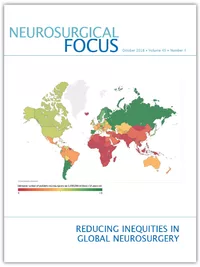Authors: Michael C Dewan, Justin Onen, Hansen Bow, Peter Ssenyonga, Charles Howard, Benjamin C Warf

Published in the Journal of Neurosurgery, July 2018
Page Range: E2
Volume/Issue: Volume 45: Issue 4
DOI link: https://doi.org/10.3171/2018.7.FOCUS18249
There is inadequate pediatric neurosurgical training to meet the growing burden of disease in low- and middle-income countries (LMIC).
This article focuses on how a hydrocephalus and spina bifida fellowship offered an intensive subspecialty training program designed to equip surgeons from LMIC with state-of-the-art surgical skills and equipment to most effectively manage common neurosurgical conditions of childhood. This is the basis for NeuroKids’ approach.
The article highlights the general model of the training approach, clinical practice, and research collaboration. It also explores the training model’s advantages and limitations.
Read the article: Subspecialty pediatric neurosurgery training: a skill-based training model for neurosurgeons in low-resourced health systems





